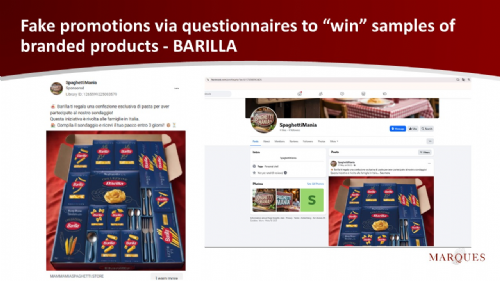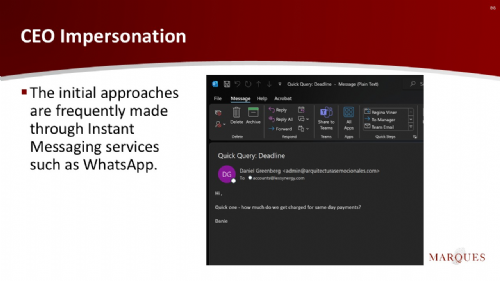Now in its twelfth year, Class 46 is dedicated to European trade mark law and practice. This weblog is written by a team of enthusiasts who want to spread the word and share their thoughts with others.
Click here subscribe for free.
Who we all are...
Webinar tackles topical social media issues
 Members of the MARQUES Cyberspace Team hosted a webinar on “Evolving Challenges and Infringements on Social Media” on 4 June.
Members of the MARQUES Cyberspace Team hosted a webinar on “Evolving Challenges and Infringements on Social Media” on 4 June.
This is the third time the Team has hosted a webinar on this topic, with the previous ones in 2012 and 2014.
Since then, said Luca Barbero, Barbero & Associates Ltd, UK, there has been a sharp increase in the misuse of signs online and in the use of social media for fraudulent activities.
The speakers tackled four key topics.
Four timely topics
Luca discussed fake promotions via questionnaires which promise branded products as prizes, using examples such as BARILLA pasta and GUCCI bags. These are seen in particular on Facebook, but Luca said Meta has been “extremely reactive” to takedown requests, often removing listings in a matter of minutes after a complaint is filed.
Kate Coffey, Zurich Insurance Company Ltd Switzerland presented on investment scams, which target the insurance and financial sectors. She said they have to be treated “case-by-case” and added: “There are no perfect solutions.”
These investment scams are often designed to go viral which means they can escalate very quickly and the victims also become promoters of the scam. The scammers frequently use brand names and logos to provide a badge of legitimacy.
“It can be very difficult to monitor and trace these documents,” said Kate, who stressed the importance of regular monitoring activity and reporting to platforms.
 In his presentation, Daniel Greenberg, Lexsynergy Limited, UK, focused on impersonator scams, where fraudsters pretend to be company directors, partners, Board members etc. Often, they use fake email addresses to ask employees to buy gift cards or other items.
In his presentation, Daniel Greenberg, Lexsynergy Limited, UK, focused on impersonator scams, where fraudsters pretend to be company directors, partners, Board members etc. Often, they use fake email addresses to ask employees to buy gift cards or other items.
The scam is difficult to monitor as the communications are not public, and they are designed to prompt people to act urgently. Also, said Daniel: “Thanks to AI, the spelling and grammar in the messages is much better than it used to be”. So it is hard to tell they are scams.
Impersonator scams do not fit easily into social media reporting tools. It is therefore important to use whatever resources are available, for example asserting copyright in individuals’ photos that are used.
Finally, Linnea Harnesk, Autoliv AB, Sweden discussed changes in enforcement on X (formerly Twitter) since Elon Musk took it over in 2022. She highlighted challenges including verified accounts impersonating brands, fake promotions, the misuse of brand names in handles and hashtags and screenshot virality.
“Takedowns have become slower and less predictable since 2022,” said Linnea. But she emphasised that trade mark and copyright reporting still exists and it is possible to file trade mark infringement claims, send warning letters, obtain injunctions and initiate actions under the EU Digital Services Act and US FTC.
Closing the discussion, Luca promised it would not be another 11 years until the next webinar on this topic!
Posted by: Blog Administrator @ 08.16Tags: Social media, cyberspace team,


 Sharing on Social Media? Use the link below...
Sharing on Social Media? Use the link below...Perm-A-Link: https://www.marques.org/blogs/class46?XID=BHA5360

